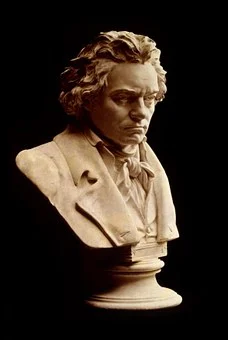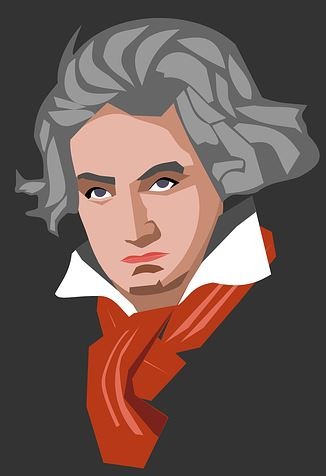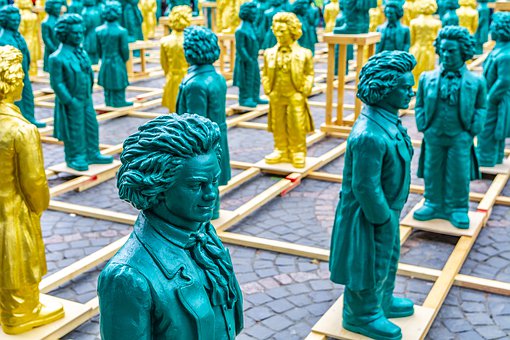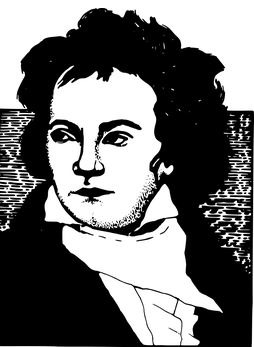Beethoven’s was baptized Ludwig van Beethoven on 17th December, 1770. He was a German musician, being both a pianist and a composer. To this date, he is still among the most known and revered composers in Western music history. His works range from the Classical Period all the way to the Romantic period. They are also among the pieces most performed from the world repertoire of classical music.
The conventional way to study Beethoven’s career is to divide it into three eras: early, middle, and later. The early period ended around 1802, when he had more or less honed and forged his talent. The next ten years (1802-1812) are considered to be his middle period, which showed his style developing into something beyond Mozart and Haydn. Some may also term this the heroic period, but this was also the time when his deafness started to grow. For the next 15 years (1812-1827), his focus was more on his innovations if the expression and form of music.
Birth and Early Life
Beethoven’s birth was in Bonn, and this was also where he showed his great musical talent from a very young age. His initial instruction was quite intensive and strict, with his main teacher being his own father, Johann van Beethoven. Later on, Ludwig van Beethoven had Christian Got lob Needed, the famous conductor and composer, as his teacher. Under him, Beethoven managed to publish his work, some keyboard variations, for the first time. This was in 1783, with the tutelage also providing him a share away from his dysfunctional family. At that time, he would spend most of his time with Helene von Braining’s family. He would teach piano to their children and also became their friend.
At the age of 21, Beethoven made Vienna his home and base. There, he studied composition under Haydn. He also gained fame with his virtuoso pianist. Soon, he was patronized for composition by big names of the time such as Kale Alois and Prince Lichnowsky. This work would lead to the three Opus 1 piano trios, the earliest compositions of his to have an opus number. This was in 1795, just four years after he came to Vienna.
Transitional Music
Many musiciloists are of the opinion that the music of Beethoven is a transitional kind. It goes from high-Classical styles to Romatcicisn, making Beethoven among the last Classicists and the first ROmantics. At the same time, he belonged to neither genre entirely.
He actually lived through this period of musical transition, where writers and musicians were working on changing how people thought. Aristocracies were weakened and falling away all over the world, America and France were both going through revolutions, and republics and democracies were fast taking over.
In fact, the aristocracy collapsing directly affected the lifestyle of Beethoven. Until his time, performers and composers would find success and fame through someone’s patronage. Forn instance, if someone was appointed as the Kapellmeister of the court, that means they had a secure means livelihood. Plus, they were free from any other business concerns, so they could let their creativity flow as they saw fit. Haydn himself was known as the national composer of Austria. He wrote several masterpieces in the time when he was the Hungarian Esterházy family’s court composer. In addition to free time and a decent income, he also had the privilege of having his own orchestra. Beethoven himself wanted more than anything to secure a position like that. Unfortunately, it was not to be; when the genius composer came of age, there were several pressures and political changes adversely affected the lifestyle of the ric and noble families. The composers suffered as well, and they began to disappear soon after the 1800s started.
Becoming a Businessman
Beethoven wasn’t exactly cast to the mercy of the streets; he had many nobles among his friends. Eventually, he did get an annuity that kept him out of dire financial straits. However, he did have to become a businessman in his dealings; he peddled his works, negotiated terms of contracts, and even sold some works for only his own decorations and he exclusive rights to perform. He also worked on presenting concerts featuring his compositions.
When first performing the Fourth and Fifth symphonies, he illustrated himself as a freelance artist, a composer,, and still a favorite among the wealthy nobles. This was because he first played the FOurth Symphony at a private concert of his own music. This was in Vienna, at Prince Joseph Lobkowitz’ palace in March 1807. The concert program includes the first three symphonies, an arias, an overture, and a piano concerto from the composer as well.
The FIth Symphony, on the other hand, was first played at a public concert or an Akademie. Btheoven presented this concert by himself, at the Theater an der Wien in Vienna in 1808.
Beginning Concerts With Himself
At the first performance of the FIth Symphony, Beethoven had all the works and compositions on the program be his own. None of them were familiar to the people of Vienna. AT that time, the theater where it was played was also very new. However, the Sixth Symphony is what actually started the concert, not the Fifth.
Before the intermission, the musical program lasted around 2 hours. The concert started at 6:30 and ended after 10:30 pm, but Beethoven also felt the need to play another, brand-new piece for solo piano, corus, and orchestra. Unfortunately, the new piece had just been finished and the composer wasn’t able to practice too much for it. While there was a major stumble in between, the orchestra managed to find the right place again and they made it through.
Even though Beethoven hadn’t proved to be much of a producer and planner, his Fifth Symphony would go on to be recognized as a global masterpiece.
Jean-François Le Sueur, the French composer, first heard the symphony while attending a Paris concert. When he walked out, he claimed to be so affected that he couldn’t find his own head to put on his hat. After composing himself, he stated the opinion that such music should not be written. Here, one may wonder what he would have thought of Pythagoras at this point in time.
Carnegie Hall Concerts
Carney Hall saw the first-ever all-Beethoven concert in 1895. On December 1th, this concert was to celebrate the 125th birth anniversary of the music composer Beethoven. Anton Seidl, the New York-based conductor and admirer of music, was the one to hold this concert.
In the spring of 1908, the New York Symphony Orchestra along with Walter Damrosch presented a Betetoven cycle with all of his nine symphonies. This was a hidtosrocalyy significant event, with the famous Gustav Molar, an Austrian composer, leading the New York Philharmonic in no less than five concerts with only Beethoven’s pieces. This was also Mahler’s first experience directing the music of the philharmonic. Over time, Mahler was also known more as a conductor than composers. When he performed, he wanted to recreate the music of Beethoven. To the end, he sought a clarity that would shed some light on the original intentions of Beethoven. He would also retouch the symphonies of Bethink; sometimes he added instruments to a passage or two. However, he also gained a lot of criticism for this practice.
Overall, Carnegie Hall has been no stranger to all-Beethoven concerts. Several famous and legendary conductors including names like Bruno Walter, George Szell, Toscanini, and Stokowski have also held all-Beethoven concerts in their turn at the esteemed venue.




